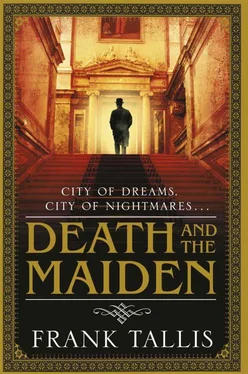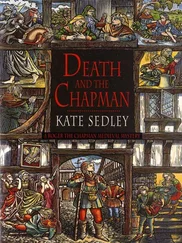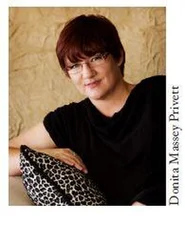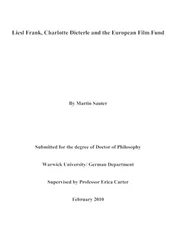Frank Tallis - Death And The Maiden
Здесь есть возможность читать онлайн «Frank Tallis - Death And The Maiden» весь текст электронной книги совершенно бесплатно (целиком полную версию без сокращений). В некоторых случаях можно слушать аудио, скачать через торрент в формате fb2 и присутствует краткое содержание. Жанр: Исторический детектив, на английском языке. Описание произведения, (предисловие) а так же отзывы посетителей доступны на портале библиотеки ЛибКат.
- Название:Death And The Maiden
- Автор:
- Жанр:
- Год:неизвестен
- ISBN:нет данных
- Рейтинг книги:5 / 5. Голосов: 1
-
Избранное:Добавить в избранное
- Отзывы:
-
Ваша оценка:
- 100
- 1
- 2
- 3
- 4
- 5
Death And The Maiden: краткое содержание, описание и аннотация
Предлагаем к чтению аннотацию, описание, краткое содержание или предисловие (зависит от того, что написал сам автор книги «Death And The Maiden»). Если вы не нашли необходимую информацию о книге — напишите в комментариях, мы постараемся отыскать её.
Death And The Maiden — читать онлайн бесплатно полную книгу (весь текст) целиком
Ниже представлен текст книги, разбитый по страницам. Система сохранения места последней прочитанной страницы, позволяет с удобством читать онлайн бесплатно книгу «Death And The Maiden», без необходимости каждый раз заново искать на чём Вы остановились. Поставьте закладку, и сможете в любой момент перейти на страницу, на которой закончили чтение.
Интервал:
Закладка:
Frank Tallis
Death And The Maiden
EXORDIUM
The Lord Marshal and the lord chamberlain, Prince Rudolf Liechtenstein, were observing Emperor Franz-Josef from the staircase. Their elevated vantage point afforded them a good view of the entire chamber. As usual, the monarch was dressed in a military uniform: dark blue trousers and a claret-coloured jacket with gold cuffs. He had three medals pinned high on his chest. He was standing erect, like a soldier on parade, stationed at the still centre of a slowly rotating spiral of humanity as various parties were presented to him. With every circuit, palace guests shuffled closer, drawn by the gravitational pull of his eminence. Each party was represented by a speaker who, when given a signal by Count Paar, would approach the emperor and make introductions. After a few words were exchanged, the group would move on, making way for the next.
Although there were a number of officers present — captains and colonels, proudly sporting their regimental colours — most of the men were civilians in sombre evening suits and white bow ties. The women who accompanied them were wearing ball gowns, some of which had been audaciously cut to expose the smooth whiteness of their backs. Lacy borders sank recklessly low, revealing the shapely convexities of the female form. A brunette sporting a corsage of jasmine and roses was making a graceful descent down the stairs. As she passed the two court officials she turned to smile at Prince Liechtenstein.
‘Your Highness.’
He inclined his head and became conscious of a sweet fragrance.
‘Who’s she?’ asked the lord marshal.
‘You don’t know her?’ exclaimed the prince, a note of disbelief entering his voice.
The woman joined a group of men at the foot of the stairs.
‘If I knew who she was I wouldn’t have asked,’ the lord marshal replied.
‘Arianne Amsel,’ said the prince. The lord marshal showed no sign of recognition and Liechtenstein was obliged to add: A soprano from the court opera. Have you never heard her sing? I don’t believe it.’
‘Do you really think I have time to go the opera?’ said the lord marshal.
‘She’s famous for her role as Senta in The Flying Dutchman and she was most impressive in Euryanthe last year. Be that as it may, she may not be with us for much longer. Not very happy: keeps on complaining about Director Mahler. I’ll introduce you.’
The lord marshal nodded and continued surveying the chamber.
On either side of the gilded double doors stood members of the Bosnian Guard. They were dressed in their distinctive garb: tunic, knickerbockers, ankle boots, tassled fez, and backpack. The lord marshal reflected that the backpack was no doubt essential for survival on the limestone slopes of the Dinaric Alps but surely somewhat redundant in the palace. More people were streaming in and joining the outer arm of the slowly moving spiral. The lord marshal returned his attention to the middle of the chamber.
‘Look who’s here.’
A bearded man in his late fifties, wearing a sash, was advancing towards the emperor.
‘They say that Mayor Lueger isn’t well,’ said Prince Liechtenstein, ‘but he looks healthy enough to me.’
‘Healthy enough to fight another election,’ said the lord marshal, before adding in a more subdued tone: ‘Worse luck.’
‘There’s a general feeling of discontent around, don’t you think?’ said the prince. ‘A feeling of dissatisfaction, a feeling that more could be done?’
‘Who have you been talking to?’ snapped the lord marshal.
The prince looked uncomfortable. ‘Surely you don’t object to a little enlightened discussion if it takes place among friends? You don’t need to impress upon me the importance of discretion.’
‘Look at him,’ the lord marshal complained, flicking a finger disdainfully at the mayor. ‘He thinks himself invincible.’
‘And if things continue as they are, he very well may be.’ Prince Liechtenstein shuddered theatrically. ‘If only someone would show some initiative.’ The two court officials stepped aside, permitting the Hochmeister of the Order of Teutonic Knights to pass. This venerable gentleman was wearing a white cape on which a large black and gold pattee cross had been embroidered. When the Hochmeister reached the bottom of the staircase the prince added, ‘One might let it be known — tactfully, of course — that men of action could depend on our support.’
‘Well, they could only depend on our support up to a point.’
‘Quite so.’
‘Thereafter …’
‘Indeed. But you have the authority and means to deal with any complications should they arise. Isn’t that so?’
Mayor Lueger was smiling — but the emperor did not reciprocate. The two men greeted each other somewhat stiffly, and the mayor began to present his party, a group of six gentlemen all in their middle years.
‘The Anti-Semitic German-Austrian Writers’ Association,’ murmured the prince.
‘How very embarrassing,’ said the lord marshal. They watched as each of the men spoke a few words to the emperor before moving on. Finally, the mayor himself bowed and followed the band of writers to the less densely populated margin.
Unexpectedly, the emperor looked up in the general direction of his two courtiers. The lord marshal and Prince Liechtenstein both corrected their posture, but it was obvious that the emperor was seeking the notice of the lord marshal rather than that of the lord chamberlain. His Majesty was clearly unhappy. The lord marshal began to walk down the stairs but the emperor shook his head. Then, turning towards Count Paar, the emperor composed himself for the next presentation.
‘This isn’t good,’ said the lord marshal.
The prince responded sympathetically. ‘Yes, but at this precise moment there is nothing you can do. Come now. Where did that singer go? Let me introduce you to her. She’s adorable.’
Part One
1
Detective Inspector Oskar Rheinhardt — a portly gentleman with a turned-up moustache and world-weary expression — was standing on the pavement of a wide tree-lined road. The fog of the previous evening had persisted and the buildings on both sides were only faintly visible as shadowy cubes, spaced apart at regular intervals. It had been a slow and perilous journey by horse-drawn cab, visibility deteriorating as they gained altitude. Indeed, they had only narrowly escaped involvement in a serious collision next to the Kaiser Pavilion.
Rheinhardt turned to address his assistant.
‘Search the grounds, Haussmann. See if you can find anything.’
‘But, sir …’
‘Yes, I know that conditions are far from ideal,’ said Rheinhardt, ‘Nevertheless …’ The inspector removed a flashlight from his pocket and handed it to his disgruntled junior. Haussmann aimed the weak yellow beam at the cobblestones, revealing nothing but a slowly undulating blanket of fog. ‘Oh, very well,’ said Rheinhardt, persuaded to reconsider the wisdom of his order: ‘You can accompany me. Perhaps it’ll lift later.’
‘Thank you, sir,’ said Haussmann, much relieved.
A figure emerged from the mist. ‘Who’s there?’
‘Detective Inspector Rheinhardt and my assistant, Haussmann.’
‘Good morning, sir. Constable Drasche.’
The young man clicked his heels. He was wearing a long blue coat, a spiked hat, and a sabre hung from his waist.
‘How long have you been here, Drasche?’ asked Rheinhardt.
‘Three hours or thereabouts.’
‘I’m sorry for the delay. The driver could barely see the road ahead of him. Who’s inside?’
Читать дальшеИнтервал:
Закладка:
Похожие книги на «Death And The Maiden»
Представляем Вашему вниманию похожие книги на «Death And The Maiden» списком для выбора. Мы отобрали схожую по названию и смыслу литературу в надежде предоставить читателям больше вариантов отыскать новые, интересные, ещё непрочитанные произведения.
Обсуждение, отзывы о книге «Death And The Maiden» и просто собственные мнения читателей. Оставьте ваши комментарии, напишите, что Вы думаете о произведении, его смысле или главных героях. Укажите что конкретно понравилось, а что нет, и почему Вы так считаете.












